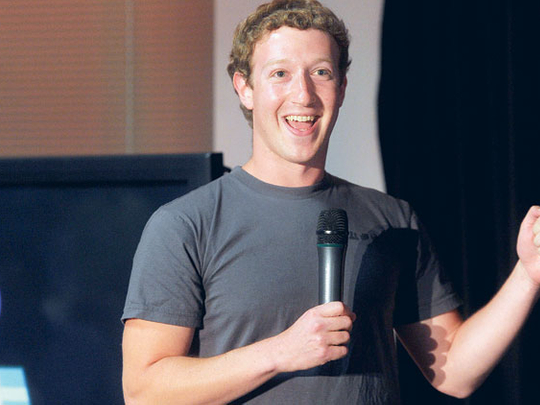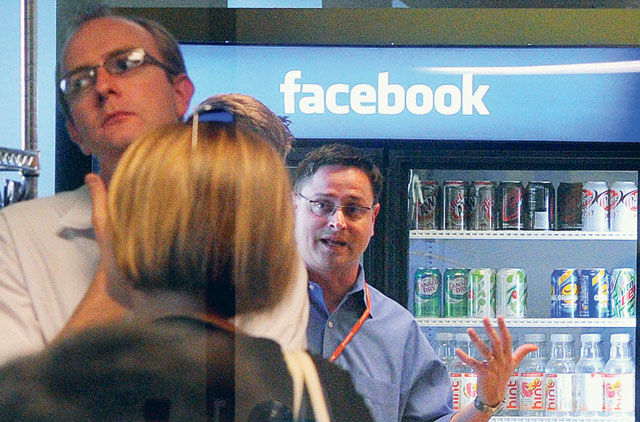
A few weeks ago, the American Consumer Satisfaction Index ranked Facebook in the bottom five per cent of all privately held companies in the United States.
By that measure, the most popular social network in the world is less liked by the average American than the property- and casualty-insurance industry, the companies that sell tax-filing software, the food manufacturing sector, and the makers of dog food.
Larry Freed, the CEO of ForeSee, the analytics company that helped compile the ACSI results, called Facebook's performance "abysmal."
"This is a rare scenario in the American economy; usually customer satisfaction is intertwined with market success," Freed wrote in a white paper that accompanied the index. He went on to identify the various reasons that consumers — the ACSI interviewed some 70,000 of them — were dissatisfied with Facebook.
Among the most pressing concerns: shoddy navigation controls, mountains of spam, intrusive advertising, annoying applications, "the constant and unpredictable interface changes," the rejiggered news feed, and problematic security and privacy controls. "There is no shortage of complaints about Facebook," Freed concluded.
The next morning, July 21, 2010, Facebook signed up its 500 millionth member. "This is an important milestone for all of you who have helped spread Facebook around the world," Facebook founder and CEO Mark Zuckerberg trumpeted on the website.
The tracking firm Hitwise published data showing that Facebook had for at least one week in July replaced Google as the most-clicked website in the US. Facebook revealed that its users spend a total of 700 billion minutes on the site a month, and half of all Facebook members sign onto the site at least once a day.
The obvious dichotomy at play here — between consumer dissatisfaction and staggering growth — has become the norm for Facebook, a site that as recently as 2006 was still struggling to compete with MySpace, the then-dominant social network. No longer.
Between January 2009 and January of this year, Facebook nearly doubled its membership, leaving MySpace in the dust. Meanwhile, Zuckerberg has predicted that Facebook will eventually hit the 1-billion-member mark worldwide, an unprecedented landmark for a social-media site.
And yet in the past year, Facebook has been regularly forced to tamp down waves of user unrest — over redesigns and more pressing problems, such as privacy — often at the same time the site is posting extraordinary traffic and membership gains.
This spring, for instance, a group of users organised a "Quit Facebook Day" event to lobby against changes to the security settings on the site. On May 31, more than 31,000 users reportedly deleted their Facebook profiles in protest.
It was enough to grab some mainstream-media attention, but not enough to counteract Facebook's rate of expansion. According to the site Inside Facebook, membership grew that May by 7.8 million users — in the US alone.
The question now is whether Facebook can continue to stave off criticism.
Dramatisation
In October, Columbia Pictures is set to release The Social Network, a movie that dramatises early conflicts between Zuckerberg and his Facebook cofounders. ("You don't get to 500 million friends without making a few enemies," reads the tag line.)
The arrival of The Social Network has been heralded by some as bad news for Facebook, but it might be more aptly viewed as evidence of the centripetal force that Facebook now plays in American culture. After all, it's hard to imagine any studio trotting out a movie version of the founding of IMDb.com.
"I definitely think Facebook is critic-proof," says Ben Mezrich, author of The Accidental Billionaires, which serves as the inspiration for The Social Network. "It's such a huge part of our lives, it's such a quickly growing company, that any critique falls flat. Unless [the Facebook staff] does something really phenomenally stupid, and I can't see for the life of me what that would be, a certain age group is going to keep using the site. That's the brilliance of Facebook."
For the time being, the majority of media watchers are inclined to agree with Mezrich, if only because there is no social-media challenger currently robust enough to knock Facebook off its perch.
MySpace has seen its traffic erode sharply over the past couple of years. Twitter is, well, too Twittery — it's treated by most users as a broadcasting service or an advertising platform, rather than a fully functioning network.
The Wall Street Journal recently reported that Google is developing a new social-media service, but the details are vague, and in the best-case scenario, it would be several years before Google could hope to rival Facebook's hold on the market. (Google launched Orkut in 2004, which never really gained traction in the US but grew very popular in Brazil and India.)
"Facebook has been able to achieve scale in a way that no social network before it has done," says Adam Ostrow, editor in chief of the social-media blog Mashable. "In other words, most of your family, friends, and co-workers are already on there, making the cost of switching to something else — or turning it off entirely — way too high right now, at least if you want to be kept up to date."
That hasn't stopped a handful of scrappy developers from trying to kick-start their own Facebook-killers. The highest profile of the bunch is the team behind Diaspora, which is being billed as "a privacy aware, personally controlled, do-it-all, open source social network."
The site is expected to launch a pilot program in early September. On the Diaspora website, the network's founders, three 20-somethings and one 19-year-old who met at New York University, say that it is their "one and only goal to get Diaspora in the hands of every man, woman, and child at summer's end." It's an intentionally quixotic statement, of course.
But it does raise the question of what exactly it would take for millions of Facebook users to decamp for a different site. A giant security meltdown? A crippling computer virus?
CEO gaffes
In recent months, tech reporters have played up a series of gaffes and missteps from Zuckerberg, including an incident at the ‘D: All Things Digital' conference in June, where the Facebook CEO seemed to be thrown off-balance by a series of questions on user security.
Several news outlets also reported that Zuckerberg has openly disparaged the intelligence of Facebook users and questioned whether Joe Facebook Member actually cares that much about his online privacy.
The image that has emerged of Zuckerberg in the press is of a shaky, sweaty executive, uncomfortable with tackling the thornier issues and insensitive toward the consumers that have made him one of the wealthiest men in the world.
But Daniel Castro, a senior analyst at the Information Technology and Innovation Foundation, says that Silicon Valley gossip about Zuckerberg will ultimately have little impact on Facebook's bottom line.
"I don't think the average user is thinking of [Zuckerberg]," Castro says. "They're thinking of themselves. And their friends."
Have your say
Do you think buying Facebook shares would be a rewarding venture? Have you had any negative experiences with Facebook exposing your personal data? Tell us at readers@gulfnews.com or fill in the form below













